Keeping in mind that any news coverage inevitably has its own slant or perspective, we present with that caveat the following newspaper reports on the close of the second General Assembly of the Presbyterian Church of America [Orthodox Presbyterian Church], which met November 14-16, 1936:
From the Brooklyn, N.Y. Eagle:–
Government Form For New Church Is Assembly Aim
Philadelphia, Nov. 14. — The second general assembly of the Presbyterian Church of America tabled all discussion today on interpreting its doctrinal standards and undertook to establish a form of government for the church founded here five months ago.
The assembly which adopted the historic Westminster confessions and catechisms as its doctrinal standards yesterday, tabled two motions today which would interpret the doctrines on the question of the second coming of Christ. Church leaders interpreted the action as assuring eschatological liberty within the church on the question.
The constitutional form was discussed at the afternoon session.
It became known today that the Rev. H. McAllister Griffiths of Philadelphia has resigned as a member of the church.
The Rev. Mr. Griffiths was ecclesiastical counsel for the Rev. Dr. J. Gresham Machen, first moderator of the new church, in his trials on charges of insubordination to the authority of the Presbyterian Church in the U.S.A. Dr. Machen was suspended from the church after the general assembly upheld his conviction.
His [Griffiths’s] resignation became known when an inquiry was made from the floor why he was not attending the assembly. The Rev. Dr. J. Oliver Buswell, moderator, did not explain the reasons for his resignation. At his home the Rev. Mr. Griffiths confirmed his resignation, but said he preferred not to make any statement.
In adopting the Westminster confessions yesterday, the delegates votes against including amendments which were adopted in 1903 by the Presbyterian Church in the U.S.A.
and from the Philadelphia Inquirer, November 15, 1936:—
Fundamentalists Stick Close to Law of Pre-Split Body
Tentative Rule Adopted; Griffiths-Machen Rift Mars Session
A tentative form of government closely following that of the Presbyterian Church in the U.S.A., from which it split last June, yesterday was adopted by the Presbyterian Church of America in the closing business session of its four-day second General Assembly.
The 100-year old constitution was accepted as the provisional working basis for the new fundamentalist order until a permanent basis can be formulated at the next assembly in Philadelphia, June 1 to 5.
In substance, the form grouped the individual churches into presbyteries, but eliminated provision for synods; arranged for the administration of local congregations and outlined requirements for admission into the denomination’s ministry.
Titles Are Guaranteed
Among major changes was a passage guaranteeing each congregation title to its property and specifically denying the “right of reversion to the Presbyterian Church of America, unless the particular church should become extinct.”
Fundamentalist clergymen pointed out that the question of property ownership was a sore point under jurisdiction of the Presbyterian Church in the U.S.A., and that the passage should clarify the issue. They insisted that under the old regime congregations were bereft of their “right” to hold title to church buildings and lands.
A discordant note in the closing hours of session came with the revelation of a rift between Dr. J. Gresham Machen, retired moderator, and Rev. H. McAllister Griffiths, his associate in forming the church as a protest against Presbyterian modernism.
Renounces Jurisdiction
The split between the two former leaders was learned when commissioners demanded an explanation of Dr. Griffiths’ failure to appear at any meetings of the Assembly. Reached at his home, the former editor of the Presbyterian Guardian, militant fundamentalist paper, admitted that he had sent a letter to the stated clerk of the Philadelphia Presbytery renouncing jurisdiction of that body.
“I have completely severed all connection with the Presbyterian Church of America,” declared Dr. Griffiths, who took a leading part in defending several clergymen ejected by the parent body. “I am an independent minister.”
Except to say that Dr. Griffiths had “performed great service to the church,” Dr. Machen refused comment, while Dr. J. Oliver Buswell, Jr., moderator, announced he had no intention of speaking on the matter.
Women’s Proposal Defeated
Adoption of the form of government followed by a report by the constitutional committee, headed by Rev. Ned B. Stonehouse, of Westminster Theological Seminary.
Vigorous opposition to admitting women to the board of trustees of local congregations defeated the committee’s recommendations that “other communicant members of the church may be elected trustees” in addition to elders and deacons. Several ministers who asserted that the change would make women eligible to office, murmured fervent “Thank God’s” when the proposal was defeated.
A charge that the assembly had side-stepped” the issue of pre-millennialism was made by Rev. J. U. Selwyn Toms, of Wenonah, N. J., yesterday afternoon after resolutions expressing the denomination’s attitude on the doctrine had been tabled in the morning. Dr. Toms declared the “covering up of the question will be a source of danger.”
Protest against the church’s refusal to guarantee tolerance of the doctrine was recorded in the minutes by Rev. Milo Jamison, of Los Angeles, Calif. “Nothing short of some such constitutional safeguard,” he declared, “could set at rest rumors that pre-millennialists are not welcome in the Presbyterian Church of America.”
Words to Live By:
It would be remarkable in our own day and time if the PCA, the OPC, or any of the conservative Presbyterian denominations were to merit news coverage by a major newspaper. It seems that only scandal sells. Valiant stands for righteousness and the glory of God are boring in the eyes of the world. Moreover, too few have the courage to take such stands, and so we are seen as unimportant. But by the grace of God, that will change. It is God and God alone who brings true change. Salvation belongs to the Lord, and as His people seek His face, He will yet again turn to favor His Church. Even so, come, Lord Jesus.
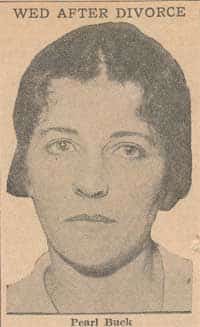 Mention the name of Pearl Buck and countless Americans will immediately think of the award-winning book “The Good Earth.” And indeed Pearl Buck did write that famous work and many other novels which earned her both a Pulitzer prize as well as a Nobel prize for literature. But how many Americans, and even church folks, know that she was instrumental in bringing about the original Presbyterian Church of America in 1936? And yet she was.
Mention the name of Pearl Buck and countless Americans will immediately think of the award-winning book “The Good Earth.” And indeed Pearl Buck did write that famous work and many other novels which earned her both a Pulitzer prize as well as a Nobel prize for literature. But how many Americans, and even church folks, know that she was instrumental in bringing about the original Presbyterian Church of America in 1936? And yet she was.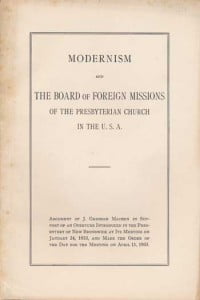 Obviously, with beliefs like this, Pearl Buck became the focus of men like J. Gresham Machen, who published a 110 page book on the Presbyterian Board of Foreign Missions of the Presbyterian Church, U.S.A. That treatment was freely presented to the congregations of the Northern Presbyterian Church. The result was that Pearl Buck was forced to resign from the China mission, though the Presbyterian Board accepted that resignation with regret.
Obviously, with beliefs like this, Pearl Buck became the focus of men like J. Gresham Machen, who published a 110 page book on the Presbyterian Board of Foreign Missions of the Presbyterian Church, U.S.A. That treatment was freely presented to the congregations of the Northern Presbyterian Church. The result was that Pearl Buck was forced to resign from the China mission, though the Presbyterian Board accepted that resignation with regret.

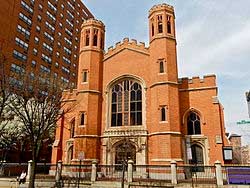
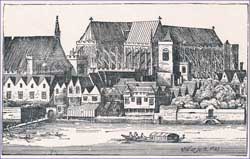
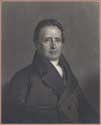
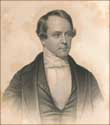


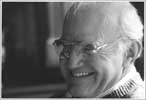
January 7: Bonus post – Eulogies for Machen
7 January, 2014 in Uncategorized by archivist | 2 comments
Two eulogies published upon the death of Dr. J. Gresham Machen. One by a close friend, Dr. Clarence E. Macartney; the other by “S. M. R.”, perhaps the editor of The Presbyterian, in the mid-1930’s. (further research required to confirm).
DR. MACARTNEY’S COMMENT ON THE DEATH OF DR. MACHEN
[as published in The Presbyterian, 7 January 1937.]
When I heard of the passing of Dr. Machen, the words of King David over Abner came to mind: “Know ye not that there is a prince and a great man fallen this day in Israel?”
Dr. Machen was my classmate at Princeton and a firm friend through all the years that have passed since then. I am glad in this public way to testify to my affection for him, my admiration for his superb intellect, his pre-eminent scholarship, his magnificent courage, and his clear discernment of the spread of apostasy in the Christian Church.
He was the greatest theologian and defender of the Christian faith that the Church of our day has produced. More than any other man of our generation, Dr. Machen tore the mask from the face of unbelief which parades under the name of Modernism in the Christian Church.
He was not only a great scholar and thinker, but a man of remarkable power as an organizer. He leaves behind him three noble institutions which are his chief monument–Westminster Theological Seminary at Philadelphia, the Independent Board for Presbyterian Foreign Missions, and the Presbyterian Church of America.
To those who did not know him, Dr. Machen may have seemed austere and censorious. But those who had the privilege of his friendship knew him as a man of the widest culture and a delightful companion.
We shall see him no more in the flesh. His eloquent voice will not be heard again in the pulpits of the land. Yet, “he being dead, yet speaketh.” Like Paul, he kept the faith delivered unto the saints, and like Paul’s noble companion, Barnabas, “He was a good man, and full of the Holy Ghost.”
Clarence Edward Macartney.
Dr. J. Gresham Machen
The speedy death after a brief battle with lobar pneumonia which closed the earthly career of Dr. Machen at the age of fifty-five, came to us as a great shock. Dr. Machen was a vigorous personality, a great scholar, yet a very humble and warm-hearted Christian. He endeared himself to his students, among whom the writer is happy to have been numbered at Princeton Seminary. He was the master of all the foremost writings of the destructive critics who did so much to undermine Christian faith, and he taught the riches of the Word with understanding as well as personal belief. He saw the poverty of the general position which was so popular a few years ago, but which has now left its votaries discomfited and bereft in the time of great need. He was a man of Reformation proportions. The Lord’s hand may now appear more plainly with the servant called home, either perpetating [sic] the denomination he started with greater power, or directing these noble men back to our own Church. Certainly we would welcome their return, as we will continue to respect them in their own endeavors.
S. M. R.
1925 – Evangelical Students
1929 – WTS
1930 – Presbyterian & Reformed Publishing
1933 – IBPFM
1936 – PCofA/OPC
Tags: COMMENT, DR, Gresham Machen, J. Gresham Machen